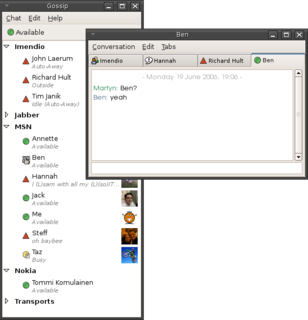
Instant messaging (IM) technology is a type of online chat allowing real-time text transmission over the Internet or another computer network. Messages are typically transmitted between two or more parties, when each user inputs text and triggers a transmission to the recipient(s), who are all connected on a common network. It differs from email in that conversations over instant messaging happen in real-time. Most modern IM applications use push technology and also add other features such as emojis, file transfer, chatbots, Voice over IP, or video chat capabilities.

LinkedIn is an American business- and employment-oriented online service that operates via websites and mobile apps. Launched on May 5, 2003, the platform is primarily used for professional networking and career development, and allows job seekers to post their CVs and employers to post jobs. As of 2015, most of the company's revenue came from selling access to information about its members to recruiters and sales professionals. Since December 2016, it has been a wholly owned subsidiary of Microsoft. As of September 2021, LinkedIn has 774+ million registered members from over 200 countries and territories.

Myspace is an American social networking service. From 2005 to early 2009, it was the largest social networking site in the world.
A social networking service or SNS is an online platform which people use to build social networks or social relationships with other people who share similar personal or career content, interests, activities, backgrounds or real-life connections.

User-generated content (UGC), alternatively known as user-created content (UCC), is any form of content, such as images, videos, text, and audio, that has been posted by users on online platforms such as social media and wikis. It is a product consumers create to disseminate information about online products or the firms that market them.

Facebook is an American online social media and social networking service owned by Meta Platforms. Founded in 2004 by Mark Zuckerberg with fellow Harvard College students and roommates Eduardo Saverin, Andrew McCollum, Dustin Moskovitz, and Chris Hughes, its name comes from the face book directories often given to American university students. Membership was initially limited to Harvard students, gradually expanding to other North American universities and, since 2006, anyone over 13 years old. As of 2020, Facebook claimed 2.8 billion monthly active users, and ranked seventh in global internet usage. It was the most downloaded mobile app of the 2010s.

Twitter is an American microblogging and social networking service on which users post and interact with messages known as "tweets". Registered users can post, like, and retweet tweets, but unregistered users can only read those that are publicly available. Users interact with Twitter through browser or mobile frontend software, or programmatically via its APIs. Prior to April 2020, services were accessible via SMS. The service is provided by Twitter, Inc., a corporation based in San Francisco, California, and has more than 25 offices around the world. Tweets were originally restricted to 140 characters, but the limit was doubled to 280 for non-CJK languages in November 2017. Audio and video tweets remain limited to 140 seconds for most accounts.
Social commerce is a subset of electronic commerce that involves social media and online media that supports social interaction, and user contributions to assist online buying and selling of products and services.

Seesmic was a suite of freeware web, mobile, and desktop applications which allowed users to simultaneously manage user accounts for multiple social networks, such as Facebook and Twitter.
The Facebook Platform is the set of services, tools, and products provided by the social networking service Facebook for third-party developers to create their own applications and services that access data in Facebook.
Taringa! is an Argentine-based social networking site geared toward Hispanophone users.
Tuenti Technologies, S.L.U is a mobile virtual network operator (MVNO), that operates with the Tuenti brand, owned by Telefónica. It is a Spain-based tech company, that focuses on providing a cloud experience through its own application and its website to their customers.
Social network advertising, also social media targeting, is a group of terms that are used to describe forms of online advertising/digital marketing that focus on social networking services. One of the major benefits of this type of advertising is that advertisers can take advantage of the users' demographic information and target their ads appropriately.
Social media marketing is the use of social media platforms and websites to promote a product or service. Although the terms e-marketing and digital marketing are still dominant in academia, social media marketing is becoming more popular for both practitioners and researchers. Most social media platforms have built-in data analytics tools, enabling companies to track the progress, success, and engagement of ad campaigns. Companies address a range of stakeholders through social media marketing, including current and potential customers, current and potential employees, journalists, bloggers, and the general public. On a strategic level, social media marketing includes the management of a marketing campaign, governance, setting the scope and the establishment of a firm's desired social media "culture" and "tone."
Google+ was a social network owned and operated by Google. The network was launched on June 28, 2011, in an attempt to challenge other social networks, linking other Google products like Google Drive, Blogger and YouTube. The service, Google's fourth foray into social networking, experienced strong growth in its initial years, although usage statistics varied, depending on how the service was defined. Three Google executives oversaw the service, which underwent substantial changes that led to a redesign in November 2015.

Silvina Moschini is an Argentine entrepreneur. As a businesswoman, she is the founder of Yandiki, SheWorks!, and Intuic and the president of KMGi Group. As an analyst of Internet trends, she appears on networks including CNN en Español and Nuestra Tele Noticias 24 Horas.

Silvio Pestrin Farina is is an Argentina businessman and systems developer. He is the creator of FictionCity, an online social network for artists founded in Buenos Aires. H
Fnbox Ventures, Inc. is a Latin American technology company primarily organized as a holding company that manages various online businesses.
The advent of social networking services has led to many issues spanning from misinformation and disinformation to privacy concerns related to public and private personal data.








